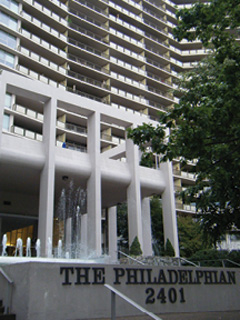story by Kristen Dowd | photo by Sarah BethBeing eco-friendly asa condo or co-op resident is possible to achieve on your own—but only to a point. You can make energy-efficient lighting decisions, use heating and cooling sparingly, and recycle, but what about the light bulbs in the hallways and lobbies, or insulating the roof? Addressing the management of common areas is key.
That’s where being eco-friendly can get a little trickier. It’s the fiduciary responsibility of board members and managers to maintain the buildings in value, comfort and appearance. So, decisions at condos and co-ops need to involve these parties and be made along with owners. But to make any greening improvement, explains Joan Batory, chair of the Green Condo/Co-op Initiative (GCCI), the single most important step that must be taken is to make a committee.
The GCCI grew out of such a green committee. “We started it with three people [in 2008],” says Sis Eisman, a resident at The Philadelphian in Fairmount. Once created, the group quickly grew.
One of the committee’s first initiatives was changing incandescent light bulbs for CFLs. The committee also drafted (and distributed) rules for recycling within the building. Next, they instituted recycling programs for cell phones, ink cartridges and electronic waste.
In 2009, the group held a Green Home Show at the Philadelphian—a day of exhibits and educational programming focused on green building for condo and co-op owners, managers and others. Soon, area buildings approached The Philadelphian, looking to make the same green improvements, and thus, the GCCI was born.
For a green committee to be influential, it needs to educate residents on the payback associated with expenditures. Batory talks about a $23 million project at The Philadelphian to improve the building’s envelope and energy efficiency. “There were several sessions with our owners here where [GCCI], and some of the proponents of the project, were trying to explain to the owners the value of spending money up front to achieve longer-term savings,” she says. “It was a very, very intense series of debates and sometimes arguments.” The discussions eventually lead to two years of construction, during which significant improvements were made, including the replacement of 2,000 windows and 8,000 individual heating and cooling units. Despite the initial challenges, says Batory, “we are now experiencing hundreds of thousands of dollars in savings.”
In addition to education, the GCCI also does advocacy work. Condos and co-ops can inadvertently slip through the legislative cracks, as they’re neither commercial buildings nor traditional residential. While programs like EnergyWorks do apply to these multi-family buildings, other green improvements can be more difficult to initiate.
The GCCI wants to change that. “We’re doing our best to open our doors and make it easy for them—legislators and planners—to deal with condos,” says Batory, who has been in communication with the City’s Office of Sustainability. “This is right along with the city’s goal. So, why can’t we have a group of condo and co-op buildings that are the greenest in America?”
To learn more about the Philadelphia Green Condo/Co-op Initiative, visit philagcci.org
Oct. 23: Inaugural Philadelphia Condo Congress
Live in or manage a condo or co-op? Be sure to attend the inaugural Philadelphia Condo Congress. The event will feature hands-on workshops, speakers, exhibitor information booths and networking sessions all aimed at showing the economic and environmental benefits of adopting sustainable practices. GCCI is hosting the event in collaboration with the Community Associations Institute and the Greater Philadelphia Condo Managers Association.
Leonard Bonacci, director of event operations for the Philadelphia Eagles, is the keynote speaker. Known for his entertaining presentations, Bonacci will talk about the team’s journey to becoming the greenest professional sports stadium in the country.
Another important part of the Congress will be four breakout sessions, discussing the various legal, economic requirements and challenges to making green improvements, and success stories from Philadelphia’s condo associations.
- Tues., Oct. 23, 2:30-7:30 p.m., free, The Academy of Natural Sciences, 1900 Benjamin Franklin Pkwy. For more details, visit philagcci.org or call the Community Associations Institute at 877-608-9777


